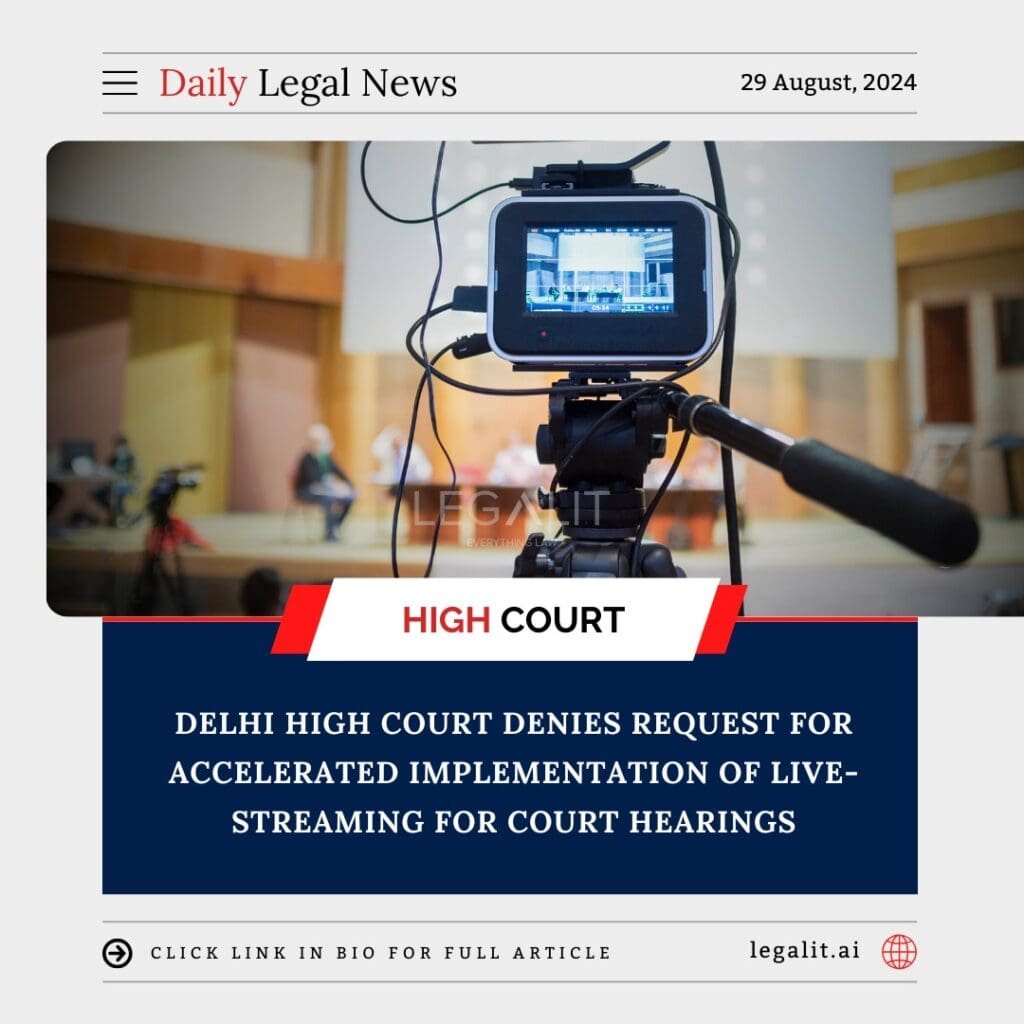
In a recent development, the Delhi High Court has rejected a plea aimed at expediting the implementation of live-streaming for court hearings. This decision has significant implications for the transparency and accessibility of judicial proceedings in India.
Context of the Plea:
- Plea Overview:
The plea sought to accelerate the process of implementing live-streaming for court hearings, arguing that it would enhance transparency and allow the public to observe judicial proceedings. Proponents of live-streaming believe it would increase accountability and public confidence in the legal system. - Court’s Decision:
The Delhi High Court’s decision to reject the plea highlights the challenges and considerations involved in implementing such a system. The Court’s ruling reflects the complexities of integrating new technologies into judicial processes and balancing various factors such as privacy, security, and procedural efficiency.
Key Reasons for Rejection:
- Technical and Logistical Challenges:
One of the primary reasons cited for the rejection is the technical and logistical challenges associated with live-streaming court proceedings. Implementing a reliable and secure live-streaming system requires significant resources, infrastructure, and planning to ensure that it functions smoothly and meets legal and technical standards. - Privacy and Confidentiality Concerns:
The Court expressed concerns about maintaining the privacy and confidentiality of court proceedings. Live-streaming could potentially expose sensitive information and personal details, raising issues related to data protection and the right to privacy for individuals involved in legal cases. - Procedural and Legal Considerations:
The decision also reflects procedural and legal considerations that need to be addressed before live-streaming can be implemented. This includes ensuring that the system aligns with existing legal frameworks and judicial protocols, as well as addressing any potential impacts on the fairness and integrity of proceedings.
Implications of the Decision:
- Transparency and Accessibility:
While the rejection of the plea may delay the implementation of live-streaming, it does not necessarily mean that the idea is off the table. The decision may prompt further discussions and evaluations regarding how best to enhance transparency and accessibility in a manner that addresses the identified concerns. - Future Considerations:
The Court’s decision highlights the need for a carefully considered approach to integrating new technologies into the judicial system. Future efforts to implement live-streaming will likely involve addressing the technical, legal, and procedural challenges identified in the ruling. - Public and Legal Community Reactions:
The decision may elicit varied reactions from the public and legal community. Advocates of live-streaming may view the rejection as a setback but will likely continue to push for reforms that promote transparency. Conversely, those concerned with privacy and procedural integrity may view the decision as a prudent measure. - Potential for Future Developments:
The decision opens the door for continued dialogue and potential future developments regarding live-streaming in courts. It may lead to the exploration of alternative methods for enhancing transparency and public engagement without compromising privacy and procedural fairness.
Broader Context:
- Global Trends:
The issue of live-streaming court proceedings is part of a broader global trend towards increasing transparency and accessibility in the judicial system. Many jurisdictions have adopted or are exploring live-streaming as a means to enhance public understanding and confidence in the legal process. - Legal and Ethical Considerations:
The debate over live-streaming involves complex legal and ethical considerations, including the balance between transparency and privacy, the impact on the judicial process, and the need to ensure that new technologies are implemented in a manner that upholds the principles of justice and fairness.
Conclusion:
The Delhi High Court’s decision to reject the plea for accelerated implementation of live-streaming reflects the nuanced and multifaceted nature of integrating new technologies into the judicial system. While the ruling may delay the introduction of live-streaming, it underscores the importance of addressing technical, legal, and procedural challenges to ensure that any changes enhance transparency without compromising privacy and fairness. As discussions and evaluations continue, the focus will be on finding solutions that align with the principles of justice and the evolving needs of the legal system.